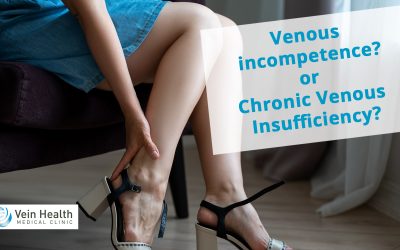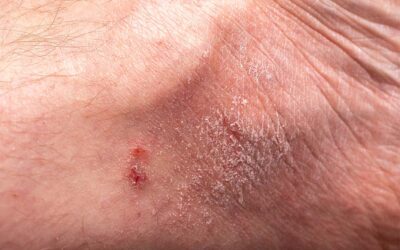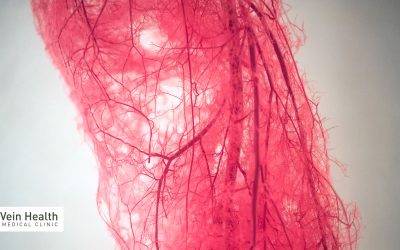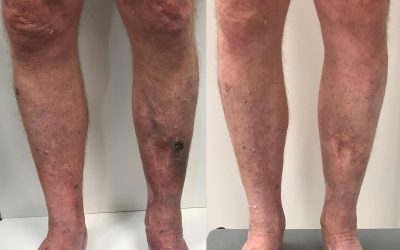Let’s take a closer look at Venous Eczema, otherwise known as Venous Dermatitis; a condition that not only affects the appearance and comfort of your skin but may point to underlying venous health issues. We aim to improve understanding by examining the medical basis of Venous Eczema, its symptoms, and treatment options, pointing the way to effective management.
What is Venous Eczema
Generally speaking, eczema is a common skin condition where the skin becomes dry, itchy and easily irritated. Venous eczema presents in the leg as itchy red weeping crusted plaques or dry fissured scaly plaques. The area can become so intensely itchy that scratching it can break the skin and cause bleeding. In addition, scratching can introduce bacteria into the area and lead to a serious infection of the skin, referred to as Cellulitis.
Understanding the Medical Basis of Venous Eczema
Venous Eczema is primarily a sign of venous insufficiency and varicose veins, where compromised blood flow and increased pressure in the veins lead to conspicuous symptoms. One of the classic symptoms that patients report is itchy veins. An often-misunderstood signal that something deeper is amiss with venous health. The Chronic Venous Insufficiency at the root of this, can lead to the leakage of blood plasma and plasma products into surrounding tissues, a key factor in the development of Venous Eczema.
The leakage of plasma and plasma products, including red blood cells and haemosiderin (a pigment from broken-down blood cells), is a critical concern, as it triggers inflammation and results in the swollen, itchy, and discoloured skin associated with Venous Eczema. Being alert to the symptoms of itchy veins, alongside other skin changes, is crucial for seeking timely and effective treatment.
The Importance of Diagnosing the Root Cause
Diagnosis at Vein Health Medical Clinic involves a detailed assessment to identify underlying conditions such as venous insufficiency or varicose veins. By utilising advanced ultrasound imaging, our experts are able to pinpoint the exact nature of the venous problems, so we can address Venous Eczema at its source.
Advanced Treatment Options
Effective management of Venous Eczema requires addressing the underlying venous conditions. Our approach includes:
- Compression Therapy: Medical-grade compression stockings are essential for managing venous pressure and improving circulation, directly impacting the symptom of itchy veins.
- Minimally Invasive Procedures: Targeting the root causes, treatments such as sclerotherapy, radiofrequency ablation, and endovenous laser therapy offer solutions to the venous insufficiency and varicose veins responsible for Venous Eczema. These procedures work by closing off the problem veins, removing the source of the plasma leakage and the related skin symptoms.
The Significance of Medical Intervention
With this deeper understanding of Venous Eczema, and the symptom of itchy veins, the importance of specialised medical intervention becomes clearer. While lifestyle adjustments and even compression therapy have their place, they are often insufficient on their own. It is through tailored medical treatments that we can effectively address the venous abnormalities causing Venous Eczema.
Vein Health Medical Clinic: Your Partner in Vein Health
At Vein Health Medical Clinic, we are committed to providing advanced, patient-centred care for venous conditions, including Venous Eczema. By focusing on the medical roots and offering cutting-edge treatments, we empower our patients to achieve lasting relief and improved vein health.
Venous Eczema, with its distinctive symptom of itchy veins, is a clear indicator of underlying venous issues. Understanding and treating these root causes is essential for effective management. If you’re experiencing symptoms of Venous Eczema, Vein Health Medical Clinic is here to help.






